Boundaries without Boundaries – 'AI-n't a Given: Mastering Key AI Literacy Skills and Pedagogical Techniques'
【Article by EMI Resource Center】
The EMI Resource Center at National Chengchi University invited Dr. Krisztina Domjan, Professorial Lecturer from the Office of Global and Immersive Studies Faculty at The American University, to give an inspirational talk entitled 'AI-n't a Given: Mastering Key AI Literacy Skills and Pedagogical Techniques.' The talk took place in the Lecture Hall of the College of Law, NCCU, on the morning of Monday, May 27th, 2024. Besides the attendance of the audience in the Lecture Hall, this event was also simultaneously broadcast online. Professor Siaw-Fong Chung, the Center's director, opened the event by explaining the split inside the title of this talk – AI, beyond doubt, is the main theme of the talk, while 'ain't' is the short form of 'is not' or 'are not'—that is, AI is not a given; we must use it with caution and acknowledgement. That is what AI literacy needs.
This talk featured interaction and immediacy. Dr. Domjan, as she often does in her classroom teaching, uploaded her presentation slides online. In several of the slides, she posed questions throughout the talk. Attendees could access the slides, which included various links, on the spot using a code provided by the speaker. They could type their responses or opinions, which were simultaneously displayed on the Lecture Hall's screen, through their laptops or cellphones.
Dr. Domjan started the talk by stating that she was neither an AI evangelist nor a data scientist. She only began experimenting with AI and studying its educational value after the release of AI chatbots in late 2022, hoping to save time on tasks using AI, similar to how her students use AI as shortcuts for homework. Dr. Domjan believes educators should learn how to incorporate AI technologies into their pedagogy seamlessly, while learners should learn how to customize AI chatbots as unpaid friends or assistants. These were the dual aims of her talk. She emphasized the significance of AI with a quote from Sundar Pichai, CEO of Alphabet and Google: 'AI is more profound than fire, electricity, or anything that we have done in the past.'
The talk was divided into three parts: first, AI literacy and an overview of AI tools in education and AI chatbots; second, AI technologies in assessment and the ethical dilemmas involved; and finally, pedagogical strategies for integrating AI. According to Dr. Domjan, AI literacy involves the ability to understand, use, and evaluate AI, including its applications, implications, limitations, and ethical considerations. AI tools can be categorized into adaptive AI, such as Duolingo, which learns from user interactions; assistive AI, which extends usage to documents or browsers like Google Chrome; and generative AI, which creates text, images, or code.
Dr. Domjan introduced several assistive AI tools for language learning, such as Announcify and Speechify (text-to-speech tools), and Voice Typing in Google Docs or MS Word (speech-to-text tools). Postlight Reader helps focus on online articles, while Rewordify and NoteGPT simplify complex texts or videos. These tools save learners time and effort in managing learning materials. Among generative AI tools, she highlighted ChatGPT and recommended Gemini for title creation. Dr. Domjan stressed the importance of constructing and evaluating prompts: clear instructions and context lead to better outputs. She advised adapting and iterating instructions to achieve desired results and encouraged users to build upon AI outputs with personal input, maintaining a critical approach.
Another key topic was the acceptance of AI-generated content in student assignments. Dr. Domjan suggested faculty should collaboratively address questions about AI assistance and citation in assignments. She proposed transparency in the classroom regarding AI use, with a 5-level scale to inform students about the allowed extent of AI use in assignments. This scale ranges from no AI use to full AI use with human oversight. She also recommended early adoption of specific AI tools rather than generative AI for assignments and emphasized teaching integrity by requiring disclaimers when AI tools are used.
The audience's enthusiasm was evident throughout the talk and afterward, with many staying to seek further advice from Dr. Domjan. The EMI Resource Center expressed heartfelt gratitude to Dr. Krisztina Domjan for her informative and practical contributions, which expanded understanding of how AI chatbots can be effectively utilized in language teaching and assessment.
For more information, please check our website:
www.eminccu.com
FB:https://www.facebook.com/nccu.emi
IG:https://www.instagram.com/nccu.emi
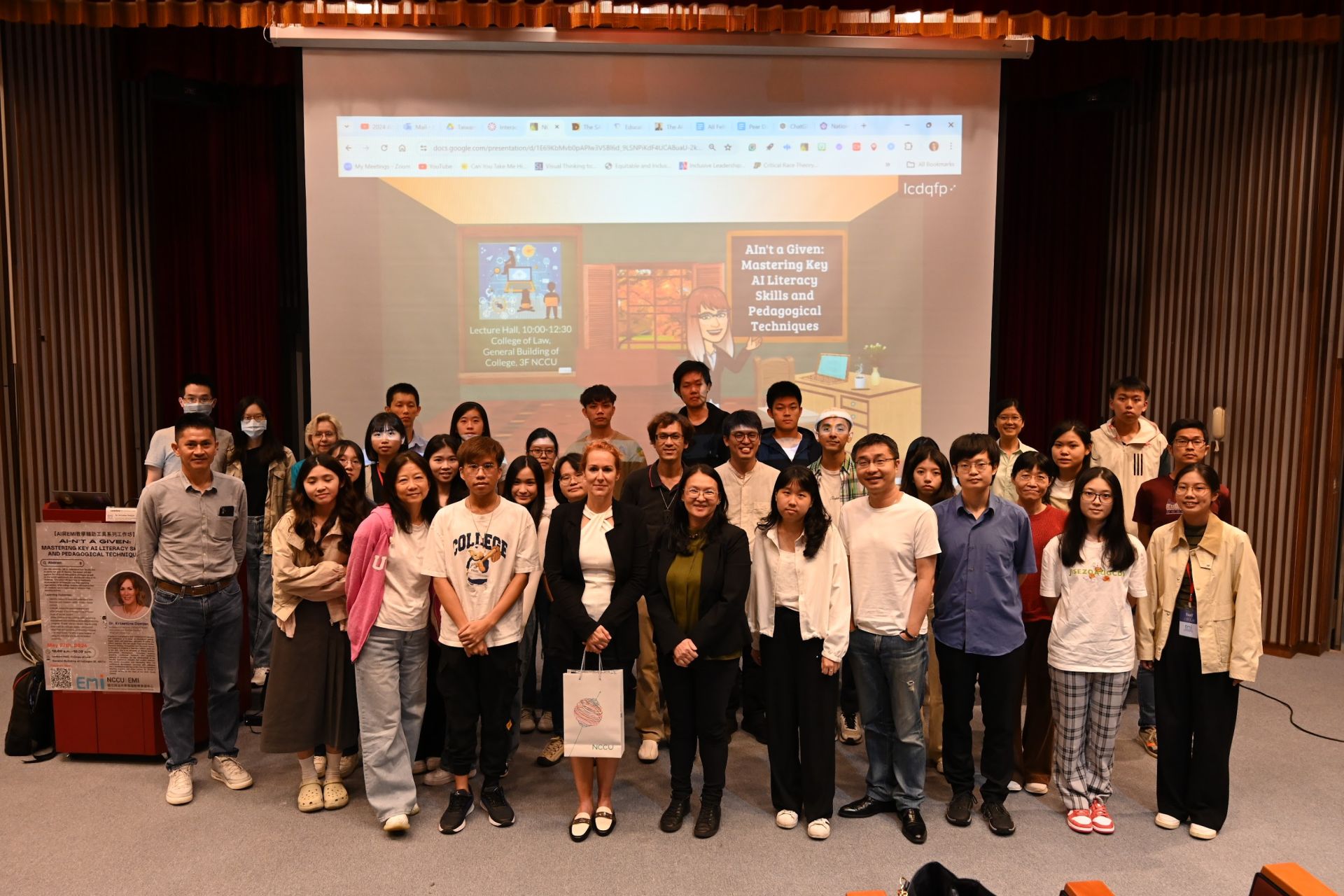
Group photo. (Photo by EMI Resource Center)
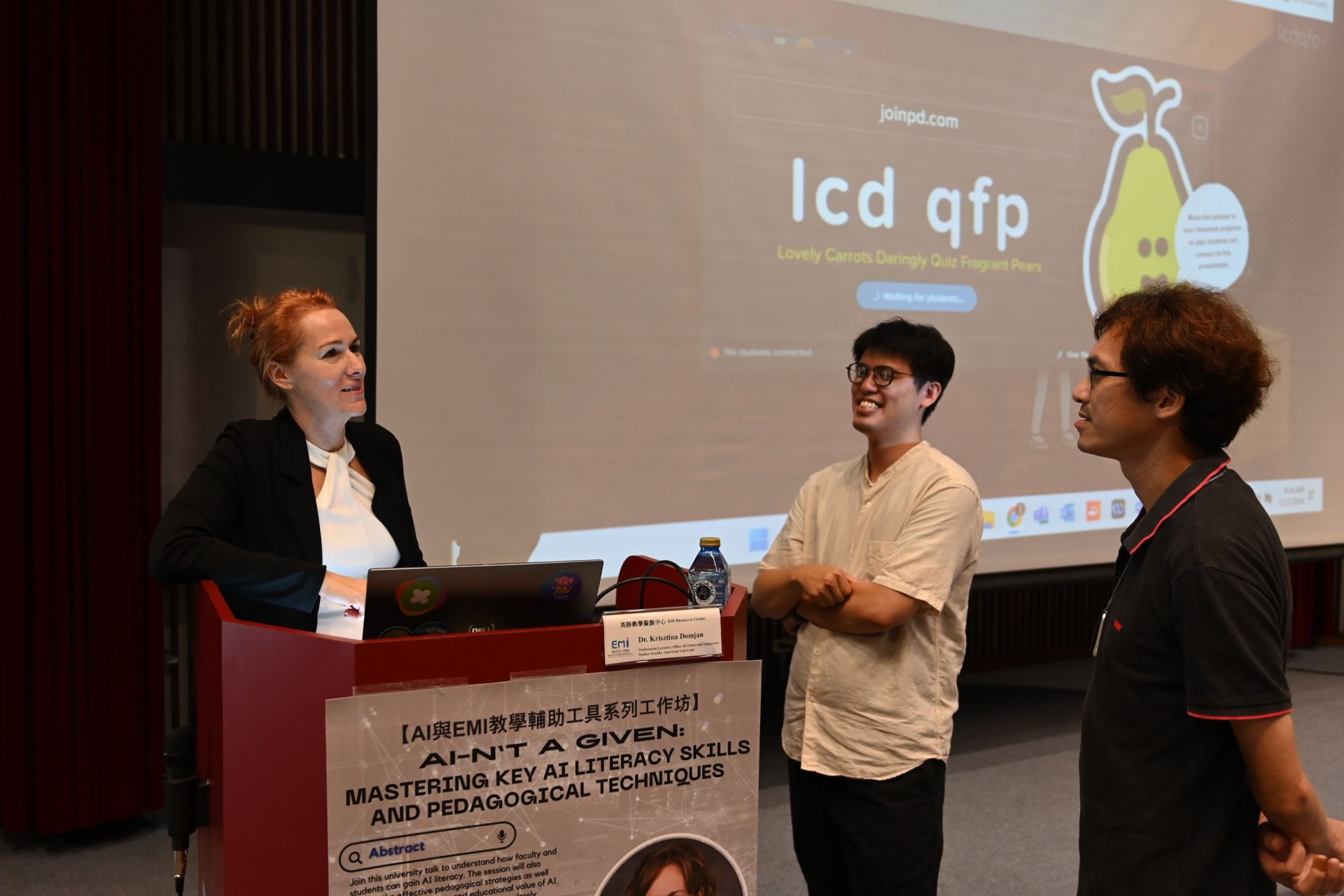
Speaker Dr. Krisztina Domjan (left) has a delightful conversation with members of the EMI Resource Center. (Photo by EMI Resource Center)
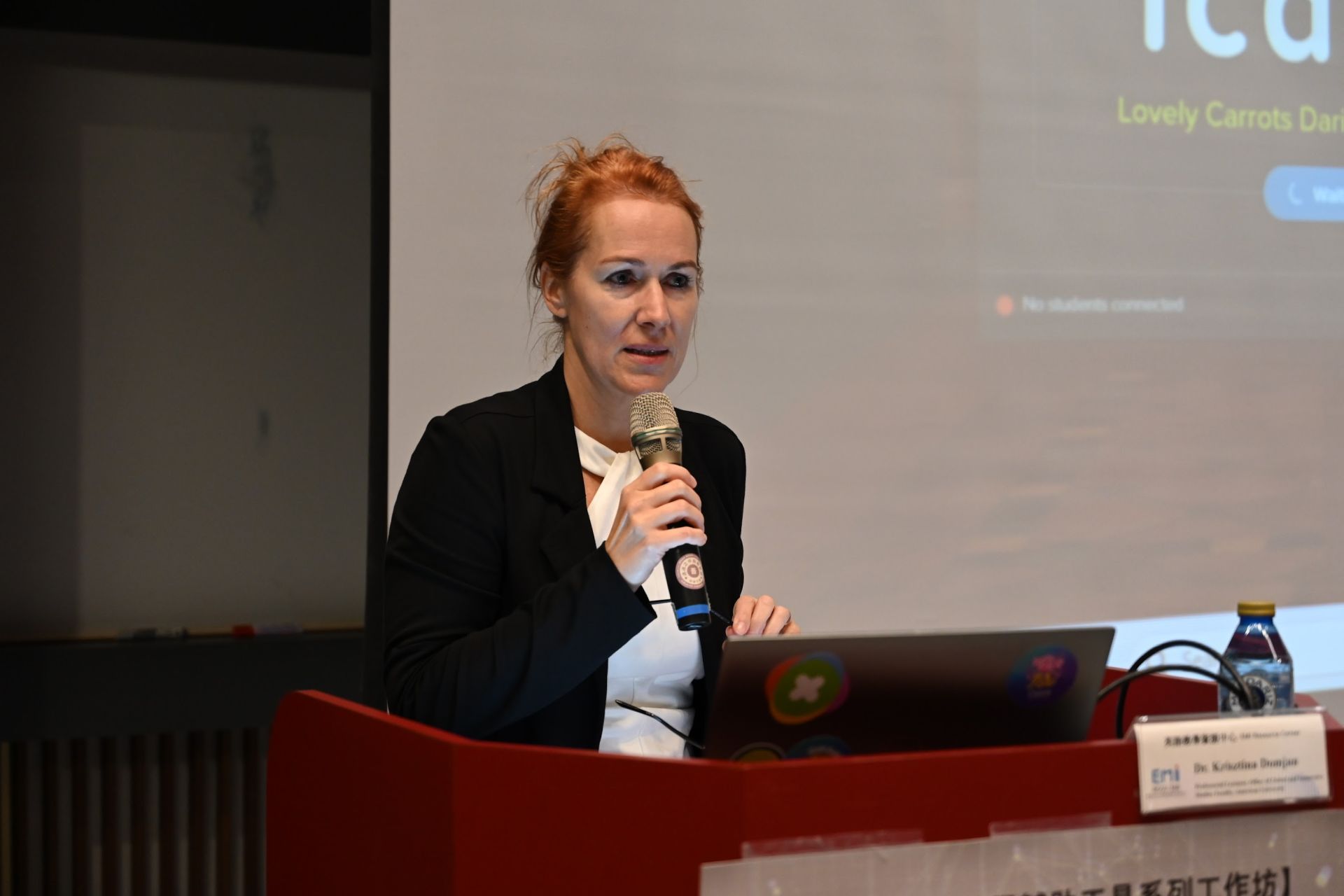
Speaker Dr. Krisztina Domjan introduced various pedagogically effective AI tools, and how to let students become autonomous and responsible learners when making use of AI. (Photo by EMI Resource Center)
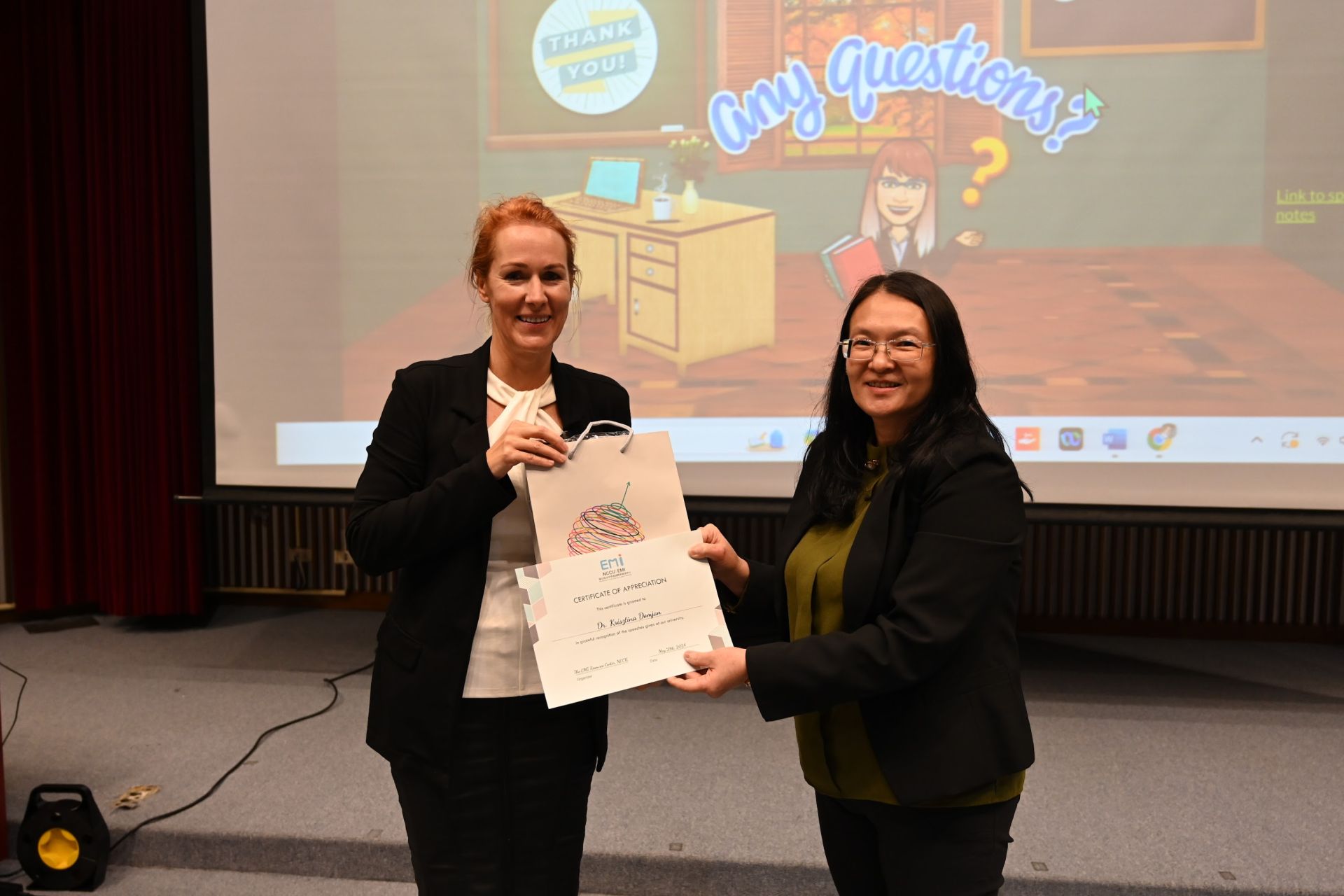
Professor Siaw-Fong Chung (right), EMI Resource Center Director, presents a certificate of appreciation to Dr. Krisztina Domjan (left), Professorial Lecturer, Office of Global and Immersive Studies Faculty, The American University, and points out the pun in the title of the talk. (Photo by EMI Resource Center)
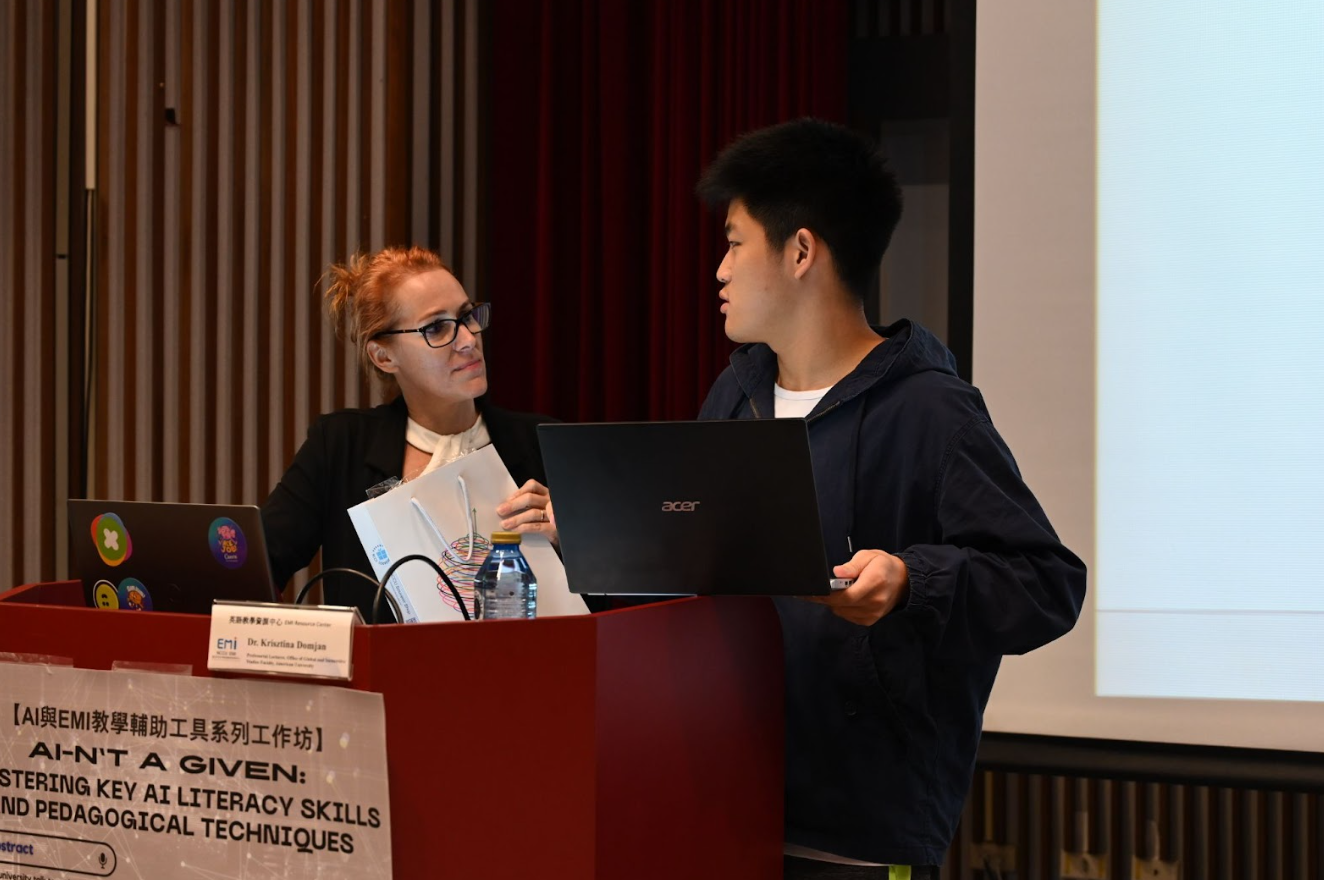
In addition to the exchange during the question-and-answer session, a number of participants stay behind after the talk to inquire more about the pedagogic applications of AI from Speaker Dr. Krisztina Domjan. (Photo by EMI Resource Center)
